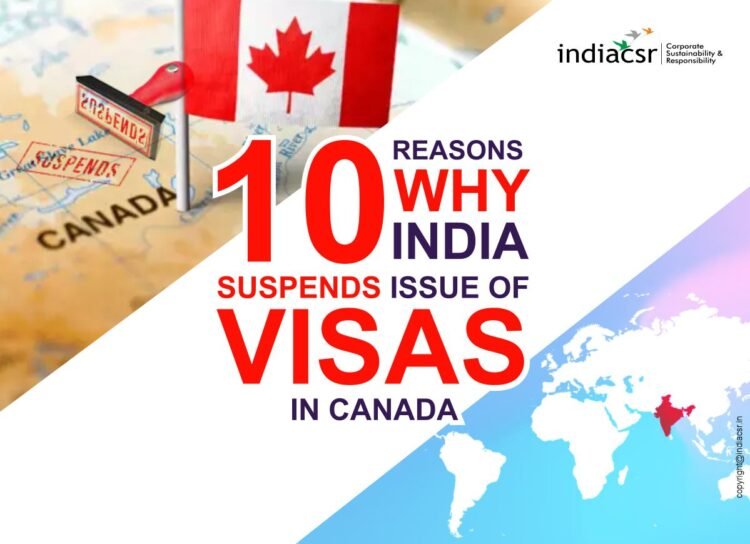The escalating diplomatic rift between India and Canada poses serious challenges, but it also opens up opportunities for both nations to engage in constructive dialogue and mutual cooperation.
In recent times, the diplomatic rapport between India and Canada is experiencing significant turbulence, evidenced by a series of retaliatory measures imposed by both sides, including the suspension of visa issuance and staff scaling down by respective High Commissions. This turbulence is reflective of India’s growing discontent with what it perceives as Canada’s inadequate response and cooperation on several sensitive matters. This analysis delves into the ongoing discord and explores avenues for resolution, underscoring the importance of dialogue, mutual respect, policy restructuring, and international cooperation
1. India-Canada Diplomatic Strain
The diplomatic relations between India and Canada are currently traversing through turbulent waters. The series of retaliatory measures announced by India, like the suspension of visa issuance and the instruction to the Canadian High Commission in Delhi to scale down its staff, underscores the deepening diplomatic strain between the two countries. These responses demonstrate India’s frustration over perceived inaction and lack of cooperation from Canadian authorities on several fronts.
2. Diplomacy Forward?
Both countries need to enhance dialogue to address the myriad of issues facing them, including the concerns over the murder of Khalistani separatist Hardeep Singh Nijjar and the allegations of involvement by Indian government agencies. The lack of concrete information and clarity from Canada has only served to escalate tensions further, exacerbating an already fragile situation. Engagements at diplomatic levels are crucial to bring about resolutions, understand diverging viewpoints, and possibly reset the bilateral ties.
3. Security & Respect in Relations
The security threats to diplomats and disruptions in visa processing are indicative of a broader issue: the need for mutual respect and adherence to international norms and conventions. The Vienna Convention stands as a testament to the principles that govern diplomatic relations between nations, emphasizing the mutual responsibility of nations to ensure the safety and dignity of diplomatic personnel. India’s emphasis on adherence to these norms underscores its commitment to maintaining the sanctity of international diplomacy and its expectation for reciprocity from Canada.
4. Expression or Political Crimes?
The clash of perceptions between India and Canada over the treatment of hate crimes and freedom of expression exposes the ideological differences that exist between the two nations. A common understanding and approach towards resolving such differences are integral to creating an atmosphere of mutual respect and cooperation. It’s vital for both nations to bridge the ideological gaps and foster a relationship based on mutual respect and understanding.
5. Fair Personnel Treatment
The denial of visas to former army officials and Intelligence Bureau personnel who served in Punjab and the subsequent raising of this issue by India with Ottawa signify the concerns related to fair and equitable treatment of personnel. This situation necessitates a comprehensive review and possibly an overhaul of the existing visa policies and practices to ensure fairness and non-discrimination.
6. Navigating Multifaceted Issues
In the wake of the ongoing tensions, both India and Canada must navigate multifaceted issues, ranging from diplomatic staffing to the treatment of hate crimes. The diplomatic discord has underlined the necessity for meticulous discussions and transparent communications to avoid any unnecessary escalations and misunderstandings. Given the respective stances, it’s vital that both countries adopt a constructive and conciliatory approach to reach resolutions on shared concerns and disagreements.
7. Balanced Policy and Law
Addressing the intricate concerns would require both nations to possibly reevaluate and revamp existing policies and legal frameworks, ensuring they are congruent with international norms and mutual expectations. An approach that balances sovereignty with international obligations can provide a conducive platform for resolving disputes and ensuring the protection and fair treatment of individuals and entities.
8. Bilateral Cooperation Strengthening
Beyond resolving existing disputes, there’s a pressing need for both countries to explore avenues for strengthening bilateral cooperation. Joint initiatives and partnerships in areas such as trade, education, technology, and defense can facilitate mutual growth and development. Reinforcing collaborations can also foster a sense of shared responsibility and mutual benefit, mitigating tensions and building a stronger foundation for a long-lasting partnership.
9. Bridging Ideological Gaps
Constructive dialogue is critical in understanding and reconciling diverging views and values. Through continuous engagement and open conversations, India and Canada can bridge ideological gaps and build consensus on contentious issues. A shared commitment to addressing and resolving underlying issues can pave the way for enhanced mutual understanding and respect, fostering a more harmonious bilateral relationship.
10. Global Peace Implications
The resolution of the diplomatic tensions between India and Canada has broader implications for international relations and global peace. A harmonious relationship between the two countries can contribute to global stability and serve as a model for resolving international disputes amicably. The international community, while respecting the sovereignty of each nation, has a vested interest in the peaceful resolution of conflicts and can play a supportive role in facilitating dialogue and understanding between the nations.
Copyright@ India CSR
Also Read:
- Indo-Canada Relations: 7 Challenges in 2023
- Mahindra’s Affiliate Resson Aerospace Corporation Dissolves Amid Diplomatic Strife between India and Canada
- Anand Mahindra’s Remuneration: A Comparative Analysis 2023
- Navigating Diplomatic Currents: Symbiotic Horizons in Indo-Canadian Free Trade Aspirations
- India-Canada Tensions: Anand Mahindra’s Bold Move Triggers Rs 7200 Cr Financial Upset







